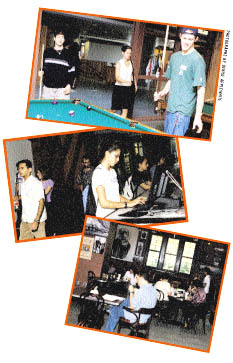|
October 25, 2000 On the Campus
Students worry about finding their place at Frist It's Thursday afternoon, and the brand- new Frist Campus Center is vibrant, its visitors engaged in a wide variety of activities that are for the first time gathered under a single campus roof. The food court downstairs is comfortably full, its small, intimate tables occupied chiefly by a continuous supply of underclassmen eating late meals on their dining contracts. Upstairs, a small but fluctuating group lounges easily in front of the television, some reading the newspaper, some with the obvious look of graduate students, and others simply passing by. Just opposite the television, technicians finalize the installation of a large graphical display wall, and at the tables behind them, a few stalwarts - and even one or two professors - are studying casually. All the while, a steady throng of upperclassmen streams past the mailboxes in the vain hope of receiving a personal letter. On the whole, the crowd in Frist on that afternoon is a very fluid one, with few patrons spending more than half an hour in the center, but that flow - the coming and going of people - is largely what creates the sense of vibrancy. The student response to the Frist Center has so far been overwhelmingly positive - all agree that such a center is long overdue, and most are excited, if by nothing else, by the very newness of the place. Of course there are complaints as well, and kinks to be ironed out, but to expect immediate perfection would be unfair. Many call the center sterile - some call it even cold, or impersonal - and hope for carpeting, more couches, and warmer lighting. Many also wonder why the game room has nothing more than two pool tables. And almost everyone complains about the exorbitant food prices - almost three dollars for a decent slice of pizza and $5.25 for a deli sandwich. Those complaints, though, are all very minor and all quite easily addressed. The more important, more lasting question is whether the Frist Campus Center will have the intended invigorating effect on the campus community. The composition of the community might seem obvious - students, faculty, and staff all interacting in shared spaces. In fact, Frist is designed with that notion of community in mind. But not everyone views the community that way. Sophomore Shaka Smith explains, "Community, for me, is more students than it is faculty. I see faculty in [Frist], and I feel like they're kind of invading my space." Even among students who would welcome more contact with faculty, most are skeptical that the new center will really foster that interaction. "While students and faculty might both use the space," predicts senior Neil Shah, "they will remain separated." Heightened interaction between undergraduates and graduate students may be more likely, as Frist represents the first space on campus over which graduate students have any real ownership. That addition, long overdue, will surely draw them more deeply into the campus community. There are benefits for undergraduates as well, although most of them seem to accrue most readily to underclassmen. Sophomore Ben Sharma, noticing the effect of the campus center on residential college life, observes, "I think it is helping bridge the divide between the Rocky/Mathey people and the Wilson/Butler people." Even for many upperclassmen Frist has already become a place to run into friends who might otherwise be hard to find. But for upperclassmen, too, who lack university meal contracts, the center is less practical as a dining option, and therefore most of the upperclass community still revolves around the eating clubs. There are a handful of independent juniors and seniors using Frist as a regular meal option, and most of those it seems to suit just fine. But sophomores seem not to be considering Frist as a viable alternative to joining an eating club at the end of the year. Sophomore Anika Binnendijk explains somewhat paradoxically, "There's not the sense of community [at Frist] that you would get at an eating club or even at 2 Dickinson co-op." Building that sense of community in Frist, one hopes, will take only time. But until then, worries senior Jeremy Sher, "The same problems of the old student center [in Chancellor Green] are going to exist in the new one - lack of comfort, lack of sense that you could just go there and hang out." If the administration responds as promised to early feedback on the campus center, Sher will be proven wrong. With a bit of minor tweaking, the Frist Center will not only have a significant impact on how the university community interacts, but it may even revolutionize the way that community defines itself in the first place.
Alex Rawson '01 (ahrawson@princeton.edu) has yet to receive any mail in his new Frist box.
|
||

 A
sense of belonging
A
sense of belonging